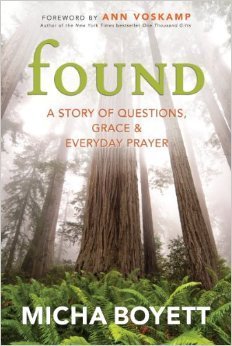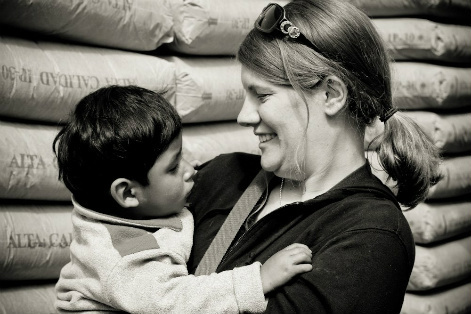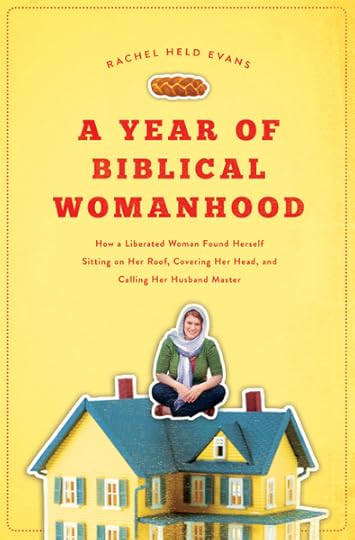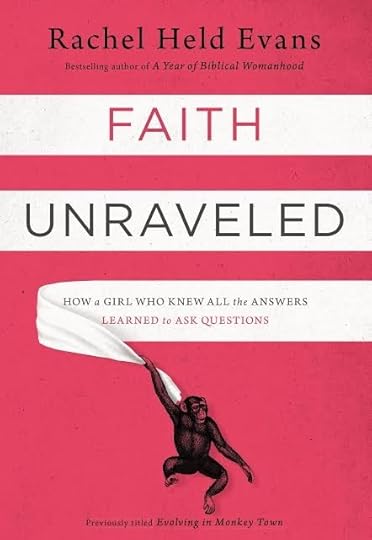Rachel Held Evans's Blog, page 23
April 3, 2014
On needing some time…(or, Oh evangelicalism, why can’t I quit you?!)
So your response to Tuesday’s post was so kind and encouraging. Thank you. It really means the world to know I’m not alone, that many of us are wandering this religious wilderness together, taking it one step at a time.
That said, this has been a painful few weeks, and I think I’ve felt some (self-inflicted) pressure to speak from that pain rather than listen to it.
So I find myself second-guessing the “leaving evangelicalism” language, not because it’s an inaccurate representation of what I’m experiencing, but because I don’t want anyone to think for a moment that this means walking away from the many, many people who identify as evangelical whom I love and respect very much. I have no interest in breaking fellowship with my brothers and sisters in Christ, be they Catholic, Anglican, Lutheran, Methodist, Mennonite progressive or evangelical. After all, we share the most important “label”— the one God gave us—as beloved children of God. (I’m beginning to think any other label might do more harm than good.)
I guess I just convinced myself that if I let go of the investment I have in the evangelical community, this alienation wouldn’t hurt as much. All the flippant “farewells” and hate mail and parody accounts and challenges to my faith wouldn't sting as much if they were coming from the “outside” rather than the “inside."
Well you know what?
It still hurts. Nothing’s changed. And the punch in the gut from last week’s World Vision situation (in which 10,000 children lost their sponsorship as a result of an evangelical protests) continues to leave me, and many others, feeling breathless.
As much as I wish I didn’t care, I still dream of an evangelicalism where both my friend Jen Hatmaker (who wrote this) and my friend Ben Moberg (who wrote this) are welcome at the same table. One baptism. One communion. One faith. One family.
Maybe it’s not worth handing that dream over to the loudest, most divisive voices. Maybe it’s worth fighting for.
...Or maybe it's not.
Maybe it's time to let go and move on and focus exclusively on being the Kingdom among the culture war's many refugees.
I don’t know. I really don’t.
So I’m thinking that instead of speaking from this place of pain and confusion, I just need to listen for a while. I plan to take some time off blogging, with the exception of a few announcements and guest posts here and there, so I can pray and yell and listen and reflect and maybe reconsider that cereal blog. (I’m kidding…mostly. I got retweeted by Captain Crunch last week, which kinda rekindled the dream.)
I think a lot of us are working through some feelings of grief as we find ourselves struggling, perhaps for the first time, with our religious identity. May we learn to sit in this grief with open hearts and minds. May God be close the brokenhearted.
Love to you all,
Rach



April 2, 2014
When The Joy Runs Out (by Micha Boyett)

Today I am thrilled to share a guest post from one of my favorite writers, Micha Boyett. Micha (pronounced "MY-cah") is a writer, blogger, and sometimes poet. She and her husband live in San Francisco with their two boys. A former youth minister, she's passionate about monasticism and ancient Christian spiritual practices and how they inform the contemporary life of faith.
Micha’s first book, Found: A Story of Questions, Grace, and Everyday Prayer released just yesterday, and let me tell you, it’s fantastic. Endorsed by Ann Voskamp, Mary Karr, Sarah Bessey and Yours Truly, Found opens a door to Benedictine spirituality through which regularly, busy people can enter and taste, see, smell, hear, and feel what it means to live life as prayer. If you’ve been struggling with prayer—particularly as a busy parent—this is the read for you.
But in the meantime, savor this beautiful reflection on joy:
When the Joy Runs Out
by Micha Boyett
I gather my two pajama-clad boys in the lamp-lit living room. They climb the couch and lean against me, warm and snuggly. They wrestle for the coveted spot in my lap. The oldest is foggy-headed. The younger one always wakes chipper. He babbles on about Mickey Mouse and “Diny” and their adventures on a train last night. I listen, then tickle the older boy’s back and talk him through his day. Today is library day and he needs to grab his book and stick it in his backpack.
Somehow it’s already 6:50. Ugh. These kids are slow as molasses. This could be a disaster. I kiss their faces and send them to their room to dress themselves. “I’m setting the timer, boys!” I yell down the hall. “If you’re not dressed by 7, you have to eat your breakfast in the car!”
I run downstairs where my husband stands in front of the mirror, already dressed for work, his shirt tucked in, his jaw set in that superman stare he makes when he’s concentrating.
This will be another morning without a shower. A bun-on-top-of-my-head morning.
There’s a rumble overhead. “Boys!” I shout up the stairs. “I hope you’re getting dressed!”
They make it in time for cereal and I spread peanut butter and jelly onto bread, slice apples, pack my computer, finish the permission slip for the Kindergartener’s coming field trip.
We are five minutes late once everyone is buckled tight and the car spins out into the rain. “But 7:35 is pretty good,” I whisper to the dashboard.
*
I’ve had a Sandra McCracken song on repeat in the car these past few days, Oh for grace to be somebody other than this / To be loved with a love that I cannot resist.
I’m sure I sang that line to the skies long before I found Sandra’s words. And now, when she sighs them through the speakers of my car, I nod my head. Yes.
“We want kid music! Mommy!” one of the voices whines behind me. I hold those words a moment longer.
To be loved with a love that I cannot resist.
*
Last month, my pastor preached a sermon on John 2, that story of Jesus’ first miracle. A wedding that runs out of wine. Water remade blood red.
“What Jesus is doing here is replacing the joy,” my pastor said. The party had failed in its hospitality and that’s embarrassing, of course. But under that story of water turned to wine is something bigger. It’s a story about everything we strive to fill our lives with, everything that fails to make us whole.
“Jesus is saying, ‘I know what you’re looking for and it’s not found here. It’s found in me,’” my pastor said.

Found. There’s that word. I always come home to that word. “In the greatest pain and suffering of our life is when we really understand that the joy actually does run out,” my pastor said. “Look at where you’re frantic and that’s probably the place where you’re trying to find joy.”
Look where you’re frantic.
*
There was a hallway outside the great big sanctuary in my childhood church. It was covered in framed photos of the church members who had gone on to full-time ministry: the missionaries, the pastors. They were the special ones, the important ones. All I ever wanted was to be included among them. All I wanted was a life that mattered.
That’s not why I went into ministry. Not really. I became a youth pastor because I loved Jesus and loved high school students. I had the energy to take a pie in the face, get it sprayed off with a water gun, sing songs at the top of my lungs, and then sit with kids and their heavy questions. Could God really love them? My job was to do all of those things: the pie and the holy conversations, one right after another. I loved it.
But we’re all full of mixed motives, aren’t we? My deepest insecurities found temporary comfort through my job. Underneath my spiritual confidence, I wasn’t sure I could ever really please God. I had too many doubts, too much anxiety. I didn’t pray enough. So I worked harder doing the work that counted most. Please God. Let my life matter.
*
When Jesus is faced with a party full of wedding goers and a room of empty wine goblets, his mother asks him to do something.
He takes the stone jars used for ritual cleansing, water meant to scrub the people clean enough for God’s holy presence. Those jars are empty. Jesus takes them and fills them with ordinary water. Then he undoes that water’s chemistry. He undoes the elements. Those jars of water are flooded with rich, aged wine.
You can’t scrub yourself clean with wine.
*

One year into motherhood, I quit ministry. I was exhausted. I had filled my days with the needs of my baby and the needs of my students, and lost prayer somewhere in the in-between. I blamed myself. I never said it out loud, but I knew I was a failure. If I had just worked harder, slept less, pushed through, I could have made it work.
Oh for grace to be somebody other than this.
I left ministry and moved with my husband across the country. And in a new city, with a new job as “stay-at-home-mom,” I wobbled. I was prayerless and sad.
In San Francisco, I wasn’t a minister. I wasn’t impressive to my new church. I wasn’t impressive to the strangers at the park. And I certainly wasn’t impressive to God. I had lost my dreams of being enough. And now, I couldn’t even remember how to pray. My fears and doubts raged.
The joy had run out.
*
Oh for grace, to be measured by more than my means / And to love with a love that gives free without strings.
“Change the song to something fun!” my boys scream. I turn the corner in the rain.
I think how much of my life I spent scrubbing myself with ceremonial water, refilling the jars, begging God to make my life holy enough. And all along, the containers weren’t empty at all. Wine was ready for the taking.
The story of Jesus is always shocking and usually begins in the simple places. I sit in the rain-soaked school-drop-off lane with a line full of other, ordinary people in cars.
God adds water to empty jars, undoes molecules, and the outcome is absurd and beautiful. We are invited to live the narrative of resurrection. God crushed and poured out. The one come from water, brought back as wine.
Here. Right now, in my unimpressive, ordinary morning: This is where Jesus takes my worn out empty self and changes the molecules. The miracle is happening.
Over and over again, and I cannot resist it.
***
Find Micha on Twitter, Facebook, and at michaboyett.com.
And don't forget to check out her beautiful book, Found.



April 1, 2014
What now?

“Where there is no love, put love - and you will find love."
– St. John of the Cross
"Are you tired? Worn out? Burned out on religion? Come to me. Get away with me and you'll recover your life. I'll show you how to take a real rest. Walk with me and work with me—watch how I do it. Learn the unforced rhythms of grace. I won't lay anything heavy or ill-fitting on you. Keep company with me and you'll learn to live freely and lightly."
- Jesus, Matthew 11:28-30, The Message
Twenty minutes after World Vision announced that in response to financial pressure from evangelicals it would reverse its decision to employ Christians in same-sex relationships, I climbed into the giant SUV of a Baptist minister, where bags of Chick-fil-A were waiting to be consumed by a group of hungry college students, and cried.
I try so hard to be professional when I’m out on the road speaking, but this had been such a blow I was shaking with anger.
“I’m so sorry,” my host said when I told him what happened. “This was wrong. This was ugly and wrong.”
(It’s amazing how, in certain moments, a simple acknowledgement of pain can be such a gift of grace.)
“You know what?” I said after a few minutes of quiet. “I’m done. I’m done with this whole conversation. I’m starting a cereal blog. That’s always been my backup plan anyway.”
“You mean….like breakfast cereal?”
“Yeah, like breakfast cereal. I’m kind of an expert on it.”
“Oh…well that sounds fascinating!”
(Say what you will about Baptists, but they are consistently, sometimes inconceivably, nice.)
“I know, right? And the only controversy would be between Cinnamon Toast Crunch people and Gold Graham people. Maybe I could work on getting those two sides to talk to each other.”
“Well, with God all things are possible.”
“Indeed.”
Within minutes I was laughing and eating chicken nuggets with a bunch of bright, engaged Christian students (at Wingate University), remembering once again that the Church is bigger and more beautiful than its ugliest moments.
***
After what happened last week, I hear a lot of people asking, “What now? What do we do after this?”
The response to World Vision revealed some major fault lines in the Church, and many of us who grew up evangelical interpreted all the gleeful “farewelling” from evangelical leaders as our final kick out the door.
As I talked to the Baptist minister about this, he said, “Seems like you’ve been wanting to leave evangelicalism for a while but can’t quite let go.”
“Exactly,” I said. “When people at progressive conferences dis on evangelicalism, I’m the first to jump in and defend it. I identify myself as evangelical in interviews with the press because I want people to know that evangelicalism is a broad and diverse movement with a common spirit, but not necessarily uniform theological or political beliefs. And I speak up when a few vocal evangelical leaders say hateful things about LGBT people or encourage bullying or condone misogyny because I feel like I have this investment in the community and it’s important for those invested in the community to speak up when its leaders are hurting our witness to the world...But I’m not sure I can do that anymore. I’m not sure I can defend a label when the label has come to mean something in our culture that isn’t worth defending anymore and when it’s been made abundantly clear that I’m not welcome at the table anyway.”
“It seems to me,” he responded, “that for you, evangelicalism is like the ex you broke up with a while ago but still stalk a little bit on Facebook.”
(I’m telling you, the dude is like a prophet.)
“That’s exactly what it is!” I said.
“Maybe it’s time to pull the plug,” he said, “for you own health and happiness.”
“Maybe it is.”
***
Don’t worry. I’m not starting a cereal blog, nor am I pulling the plug.
But I’m done fighting for a seat at the evangelical table, done trying to force that culture to change.
For many years, I felt that part of my call as a writer and blogger of faith was to be a different sort of evangelical, to advocate for things like gender equality, respect for LGBT people, and acceptance of science and biblical scholarship within my community. But I think that perhaps I became more invested in trying to “fix” evangelicalism (to my standards! oh the hubris!) than in growing Kingdom. And as helpful as I know that work has been for so many of you, I think it’s time to take a slightly different approach.
So rather than wearing out my voice in calling for an end to evangelicalism’s culture wars, I think it’s time to focus on finding and creating church among its many refugees—women called to ministry, our LGBTQ brother and sisters, science-lovers, doubters, dreamers, misfits, abuse survivors, those who refuse to choose between their intellectual integrity and their faith or their compassion and their religion, those who have, for whatever reason, been “farewelled.”
Instead of fighting for a seat at the evangelical table, I want to prepare tables in the wilderness, where everyone is welcome and where we can go on discussing (and debating!) the Bible, science, sexuality, gender, racial reconciliation, justice, church, and faith, but without labels, without wars.
I want this little online community to be like Kathy Escobar’s beautiful church in Denver, The Refuge, “where everyone is safe but no one is comfortable.” I want it to be a place where we can tell our stories, confess our sins, discuss Scripture, ask questions, disagree with grace, grieve, heal, create, follow Jesus, and rally together to do justice and love mercy—not just with our words, but with our actions. I want it to be a community that partners with people and organizations serving those on the margins. I want it to be a community led by people like Jeff Chu, Ben Moberg, and Christena Cleveland who exhibited more grace and patience last week than I knew was possible. I want it to feature and celebrate the voices of those speaking prophetically from the margins. I want us to continue to advocate for "the least of these."
I want this community to be a place where the churched and un-churched, Republicans and Democrats, American citizens and people from around the world, can come together to dream big dreams for the future. I want it to be a place where those who tired and worn out from religion can find rest…not more fighting, not more judgment…just rest and peace for weary souls. I want us to be a community where we "learn the unforced rhythms of grace" together.
Of course, each of us will respond to the events of last week differently. Sarah Bessey wrote two beautiful and instructive posts that I hope you will read after this:
I certainly hope we create a community here where everyone - those leaving evangelicalism, those staying, and those just trying to figure it out - is welcome to the table, so long as it is approached with peace.
***
Finally, you can take the girl out of evangelicalism, but you can never take evangelicalism out of the girl. And that’s fine by me.
I will forever be grateful for all the beautiful gifts evangelicalism gave me—a high esteem for and knowledge of Scripture, a heart for activism, and a deeply personal experience and expression of faith. It was, after all, evangelicals who baptized me, evangelicals who taught me to read and pray and cook. It was evangelicals who first called me a Christian, evangelicals who first told me I was beloved by God. And it was evangelicals (my parents) who let me sob in their arms yesterday, evangelicals who risked their reputations to reach out in peace last week.
Evangelicalism has been and always will be home. I suspect a part of me will always miss it.
But there’s something strangely liberating about standing in the middle of this scorched earth terrain with the resolution to stop fighting, the resolution to give up. I am reminded of the one thing all we Christians have in common, whether we’re Evangelical, Roman Catholic, Pentecostal, Presbyterian, Greek Orthodox, Seventh-Day Adventist, Anabaptist, Quaker, or something in between: We are Resurrection people.
Our God is in the business of bringing dead things back to life, so if we want in on God’s business, we better prepare to follow God to all the rock-bottom, scorched-earth, dead-on-arrival corners of this world—including those in our own hearts— because that’s where God works, that’s where God gardens. There’s no ladder to holiness to climb, no self-improvement plan to follow. It’s just death and resurrection, over and over again, day after day, as God reaches down into our deepest graves and with the same power that raised Jesus from the dead wrests us from our pride, our apathy, our fear, our prejudice, our anger, our hurt, and our despair.
Most days I don’t know which is harder for me to believe: that God reanimated the brain functions of a man three days dead, or that God can bring back to life all the beautiful things we have killed. Both seem pretty unlikely to me.
This never-ending winter has felt like one long Easter Saturday.
But Sunday's coming....I can feel it.
***
So, how do we recover from the mess of last week? What do we do to grieve, to heal, to build bridges, to open up some tables, and to move on? What does it look like to find and create church among the culture war’s refugees?



March 30, 2014
Video: Jeff Chu on Growing Up Gay in the Church
No Superlatives today, but I simply had to share this video. Our friend Jeff Chu, author of Does Jesus Really Love Me?, delivered an amazing speech at the Progressive Youth Ministry Conference in Chicago, which you can read more about here. This is a must-watch for anyone in ministry... well, and everyone else too. Enjoy.



March 26, 2014
World Vision Update
My sources are confirming that, after pressure from evangelicals, World Vision has decided to reverse their decision on employing gay and lesbian people.
I don't know what to say. I really don't.
For those of you who donated, thank you. That money will be put to good use, I assure you. But I am deeply, profoundly sorry that I inadvertently rallied these fundraising efforts in response to a decision that would ultimately be reversed. Though I certainly hope everyone who sponsored a child or made a donation will continue to support World Vision, I can see how this effort would make you feel betrayed, as though it were launched under false pretense. And I'm so, so sorry for that. I'm as surprised by all this as you are.
This whole situation has left me feeling frustrated, heartbroken, and lost. I don't think I've ever been more angry at the Church, particularly the evangelical culture in which I was raised and with which I for so long identified. I confess I had not realized the true extent of the disdain evangelicals have for our LGBT people, nor had I expected World Vision to yield to that disdain by reversing its decision under pressure. Honestly, it feels like a betrayal from every side.
Something has to change. And I'm as committed as ever to being a part of that change.
But not today.
Today, I don't know what else to do but grieve with everyone else who feels like a religious refugee today. This sucks, and I'm so, so sorry.
I hope you take some comfort in the fact that perhaps, as a result of our petty warring, some kids were sponsored today.
***
P.S. I want to share this comment from reader Dan:
"I sponsored a child because of their original decision. His name is also Daniel and he lives in the Dem Rep of the Congo, which co-incidentally, I am planning on traveling to in November (though I have no plans to see him.)
As a gay man, I am once again disappointed by the actions of some evangelical Christians. I have learned not to expect much from conservative Christianity and tend to give conservative Christians a wide berth. I want to reconcile. I am a graduate of Azusa Pacific University and remain a committed, Episcopalian, Christian. But I often feel like Charlie Brown when he tries to kick Lucy's football when engaging evangelical Christians and this is no exception.
However, none of this is the the fault of the child I sponsored. I'm not going to unsponsor because they reversed their decision. It's ultimately about the child's welfare."



Who's this child sponsorship about, anyway?

Photo by Matthew Paul Turner
UPDATE:
My sources are confirming that, after pressure from evangelicals, World Vision has decided to reverse their decision on employing gay and lesbian people.
I don't know what to say. I really don't.
For those of you who donated, thank you. That money will be put to good use, I assure you. But I am deeply, profoundly sorry that I inadvertently rallied these fundraising efforts in response to a decision that would ultimately be reversed. Though I sincerely hope everyone who sponsored a child or made a donation will continue to support World Vision, I can see how this effort would make you feel betrayed, as though it were launched under false pretense. And I'm so, so sorry for that. I'm as surprised by all this as you are, but I take full responsibility.
This whole situation has left me feeling frustrated, heartbroken, and lost. I don't think I've ever been more angry at the Church, particularly the evangelical culture in which I was raised and with which I for so long identified. I confess I had not realized the true extent of the disdain evangelicals have for our LGBT people, nor had I expected World Vision to yield to that disdain by reversing its decision under pressure. Honestly, it feels like a betrayal from every side.
Something has to change. And I'm committed to being a part of that change. But not today.
Today, I don't know what else to do but grieve with everyone else who feels like a religious refugee today. This sucks, and I'm so, so sorry.
I hope you take some comfort in the fact that perhaps, as a result of our petty warring, some kids were sponsored today.
**
No official numbers have been released yet, but my contacts at World Vision report that thousands of children lost their sponsorships yesterday as evangelicals withdrew funds in protest to World Vision’s policy of employing people in same-sex marriages.
(Note: I’m so thankful to those who responded to this awful situation yesterday by sponsoring kids or making donations to World Vision. Thank you for that. It’s encouraging!)
We’ve already discussed how this mass defunding reveals a pervasive problem within evangelicalism of singling out and stigmatizing gay and lesbian people, but today I want to address a common refrain I’ve been hearing from people who have chosen to cut off funding to their sponsored children:
“We’ll just drop our sponsorship with World Vision and move that money to another organization that better reflects our values.”
I understand the sentiment, but the truth is, redirecting funds to another organization does not change the fact that a community that was depending on that monthly gift from you will no longer receive it, and a child who once looked forward to your letters will no longer receive them.
Preston Yancey articulated it well yesterday when he said, "As a World Vision sponsor, you gave your word to a child, not to the organization. That’s what is at stake here."
Simply swapping out sponsored children as one would trade in an old car reveals the fact that that your sponsorship isn’t really about the child and the community your sponsorship helps; it’s about you. It’s about feeling good about the face on the refrigerator, regardless of whose face it is.
Removing funds from one organization and putting them into another certainly makes a point. But it makes a point at the expense of already disadvantaged men, women, and children who were counting on that funding for basic necessities.
And I have to ask: Is that really worth it?
Obviously, we’re all free to choose to support organizations with models and policies we prefer. Dan and I support humanitarian organizations that don’t always align perfectly with our own viewpoints on politics or theology, but we wouldn’t dream of withdrawing our support unless we really believed that support was doing more harm than good…(which may sometimes be the case, but not, I would argue, in this one).
When I travelled to Bolivia with World Vision in 2011, I learned a lot about how the sponsorship model works. What I love about World Vision’s community development model is that it represents what you might call trickle-up economics. When World Vision partners with a community, it begins by identifying and tackling the needs of its most vulnerable members, its children, and then works to address the root causes of those problems in the community. Sponsorship donations are pooled so that one portion goes directly to a child and his or her specific needs and another goes to the needs of the community.
In Bolivia, I saw how sponsorship money has funded everything from guinea pig farms, to after-school programs, to hearing aids, to irrigation systems, to marriage counseling, to maternal health initiatives, to alcoholism support groups, to dams. What starts as a mustard seed—addressing the needs of a single vulnerable child— grows into a tree in which the birds of the air can nest.
No wonder World Vision is widely recognized as one of the most reputable and effective nonprofit organizations in the world! It’s doing Kingdom work in Kingdom ways: from the ground up.
(For more on this, check out my posts from Bolivia, “Trickle Up Economics and Dam Good Story” and “Confessions of a Sponsorship Skeptic.”)
Now, I realize sponsorship models aren’t everyone’s cup of tea, and there are certainly pros and cons to that approach to fundraising. I’m not here to try and sell you on child sponsorship if you’re not already sold.
But make no mistake. Deliberately cutting off funding to your sponsored child affects that child and her community. If you didn’t think that money was actually making a difference, then why were you sponsoring to begin with?
So if you like another organization’s politics more than World Vision’s but still want to sponsor children, fine. Sponsor a child from both.
But please, for the love, don’t leave a child and a community that was depending on you in a bind so you can make a point about gay marriage. It’s just not worth it.
“Suppose a brother or a sister is without clothes and daily food. If one of you says to them, “Go in peace; keep warm and well fed,” but does nothing about their physical needs, what good is it?” – James 2:15




See you in Wingate (NC) and Houston (TX)…
And the travel continues!
On Wednesday, March 26, I’ll be speaking about my year of biblical womanhood at Wingate University near Charlotte, North Carolina at 8:00 p.m. at the George A. Battle Fine Arts Center in the McGee Theater. The event is free and open to the public. Book signing to follow.
And on Friday, March 28, I’ll be speaking about millennials and the Church at 7 p.m. at South Main Baptist Church in Houston, Texas. What’s especially cool about this event is that starting at 5 p.m. there will be a FOOD TRUCK MEET-UP outside the church that includes Bernie’s Burger Bus, Monster PB&J, Espresso Rescue, Front Porch Desserts and more. There is no charge to attend the event. Book signing to follow. You can learn more here.



March 25, 2014
On the World Vision Reaction: Some Bad News, Some Good News, and Some Ideas

UPDATE: So it may have been a mistake to post this when feelings were still so raw. I'm concerned that the article has failed to generate healthy dialog - and I take full responsibility for that - so I'm going to close the comment thread at 5 p.m. EST on Tuesday, March 25. I'm thrilled that so many people have decided to sponsor children or make a donation through World Vision, so I'll definitely leave the post up. Perhaps we can revisit the conversation in a few days or weeks when we've had some time to reflect. Thanks!
***
So here's what happened...
On Monday afternoon, Richard Stearns, president of the Christian humanitarian organization World Vision, announced that his organization would not be taking a position on the divisive issue of same-sex marriage. The charity would, however, permit the employment of gay Christians in legal same-sex marriages.
Stearns told Christianity Today:
"It's easy to read a lot more into this decision than is really there. T his is not an endorsement of same-sex marriage. We have decided we are not going to get into that debate. Nor is this a rejection of traditional marriage, which we affirm and support….We're not caving to some kind of pressure. We're not on some slippery slope. There is no lawsuit threatening us. There is no employee group lobbying us. This is not us compromising. It is us deferring to the authority of churches and denominations on theological issues. We're an operational arm of the global church, we're not a theological arm of the church.”
Across the Web, many evangelicals responded by declaring their intentions to pull their financial support from World Vision over the matter. Denny Burk of Southern Baptist Theological Seminary tweeted “Farewell, World Vision.” Trevin Wax at The Gospel Coalition wrote a blog post placing all the blame for pulled child sponsorships on gay and lesbian people and their supporters, saying he “grieves for the children” who will lose access to basic necessities over the issue, before including single parents and divorcees among those who are destroying the lives of children around the world. He posted a picture of a crying black child at the top of his post for effect, reinforcing his message that it’s the fault of “those sinners over there” that evangelicals have been forced to deprive that hungry child of food.
Let me repeat that sequence of events:
1) World Vision announces it will not take a position on debates around gay marriage, but will employ people in same-sex marriages in its U.S. offices.
2) In protest, some evangelicals threaten to halt their current funding for food, water, clothing, and shelter to children and communities sponsored by World Vision.
3) Evangelical spokespeople say they “weep for the children” who will suffer as a result of pulled sponsorships, and blame gay and lesbian people (and divorcees and single parents) for the actions of evangelicals.
It’s as ridiculous as it sounds.
And it puts into stark, unsettling relief just how out-of-control the evangelical obsession with homosexuality has become. Organizations don’t get “farewelled” for hiring divorcees. People don’t get kicked out of their churches for struggling with pride or for not wearing head coverings when they pray. (See “Everyone’s a Biblical Literalist Until You Bring Up Gluttony.”) But when it comes to homosexuality, Trevin Wax and many others have decided “the gospel is at stake.”
I have to ask: Since when? Since when has the reality that Christ has died, Christ has risen, and Christ will come again ever been threatened by two men committing their lives to one another? Since when have the historic Christian creeds, recognized for centuries as the theological articulation of Orthodoxy, included a word about the issue of gay marriage? Since when have my gay and lesbian friends—many of whom are committed Christians—ever kept me from loving God with all my heart, soul, mind and strength and loving my neighbor as myself? Since when has a single interpretation of the biblical passages in question here been deemed the only one faithful Christians can have?
The gospel is at stake only insofar as we make one’s position on same-sex marriage a part of it. The gospel is threatened, not by gay people getting married, but by Christians saying support or opposition to gay marriage is an essential part of the gospel when it’s not.
Furthermore, the notion that the way to “punish” World Vision is to withdraw support from its efforts to feed, clothe, heal, comfort, rescue, and shelter “the least of these” is so contrary to the teachings of Jesus—particularly Matthew 25:31-46—it’s hard to know where to start.
I’m a longtime World Vision supporter and I’ve seen firsthand the effectiveness of its work, particularly child sponsorships. Like my friend Nish, I beg Christians not to drop their sponsorships or monthly giving to World Vision because they don’t like the idea of gay people working for the organization. (If you’re having second thoughts about that, just imagine writing a letter to your sponsored child explaining exactly why you can’t help him or his community anymore.)
I’m always careful not to equate opposition to gay marriage with hate. But the singling out and scapegoating of gay and lesbian people that’s happening here is deeply troubling to me. When Christians declare that they would rather withhold aid from people who need it than serve alongside gay and lesbian people helping to provide that aid, something’s very, very wrong. It might not be hate, but it is a nefarious sort of stigmatizing, and it’s wrong.
Finally, all this overdramatic “farewelling” over non-essential issues is getting tiresome. It’s shutting the door of the Kingdom in people’s faces. It’s tying up heavy burdens and placing them on people’s backs. It’s straining gnats and swallowing camels. It’s playing the gatekeeper with smug, self-righteous pride when it is God who decides who comes to the table, God who makes the guest list, God who opens the doors the Kingdom.
Perhaps the greatest irony of all is that in rejecting the poor, the hungry, the marginalized, the outcast, and “the least of these,” these brothers and sisters have essentially “farewelled” Christ Himself. What a lonely world they have created!
But now, the good news…
The good news is that the Gospel isn’t a coalition to delineate and defend, but an expansive, worldwide movement that knows no political or geographic boundaries. It is a like a tree that is growing toward the sky, with enough branches for all the birds of the air to find a place to nest. It’s like a hidden pearl, like wheat growing among tares, like mustard seeds splitting beneath the soil. It’s alive and it’s growing and it won’t be stopped.
The good news is that God makes the guest list to the heavenly banquet—not you , not me, not Denny Burk, not John Piper.
The good news is that thousands of World Vision staff from around the world will continue their good work today - building wells, providing life-saving vaccinations, caring for Syrian refugees, partnering with communities to develop business and agricultural opportunities, lifting families out of poverty, and feeding, clothing, and sheltering vulnerable children.
The good news—and I want those of you who are discouraged to hear this— is that things are changing. As loud as these legalistic voices may seem right now, you will notice that they are often the same voices, over and over again. What I hear every day on the road and in my office is something different. It’s a freedom song, and it’s coming from thousands of pastors, writers, parents, teachers, and Christ-followers from all walks of life from all around the country and world. My desk is cluttered with books arguing for a more compassionate and inclusive way forward. Where I once scoured the internet for articles in support of women’s equality and LGBT equality, they are now plentiful, overwhelming. Letters detailing changed hearts and minds clog up my inbox. Things are changing. Hearts are softening. People are listening to their gay and lesbian brothers and sisters and engaging Scripture in fresh, yet faithful, ways. And even when we disagree, there is a growing desire to drop our weapons, stop waging war, and start washing feet.
So what do we do now?
Well, a few things come to mind:
1) Let’s remember that we’re talking about real people here—real sponsored children, real World Vision employees, real Christians on both sides of the issue. Let’s pray for Richard Stearns, for the few employees who are caught in the middle of this and who must be experiencing a profound sense of isolation and sadness over how people are responding to their presence, and for the children, families and communities that are currently benefiting from the good work of World Vision. And let’s pray too for our enemies, real or perceived, that we can love them better in the midst of differences.
2) Let’s speak up. The singling out, bullying and scapegoating of gay and lesbian people by the Christian community really must stop. It has gotten totally out of hand. Let’s push back on this idea that gay marriage is a “gospel issue” and that we must break fellowship with those with whom we disagree. And let's take responsibility for our giving or lack of giving instead of blaming it on other people.
And let's talk. Michael Hidalgo offers up some great conversation-starters here.
3) If you are so inclined, consider sponsoring a child or making a one-time donation to World Vision, to help compensate for the funding and sponsorship being pulled. I’d love to see us partner with my friends Kristen Howerton and Nish Weiseth to help care for the children and communities left in a bind because of pulled funding over this issue. World Vision is doing important work right now with Syrian refugees, for example, and it would be a shame to see that work suffer.
If you’re interested in learning more about how sponsorships work, check out my reports from Bolivia:
Trickle-Up Economics and a Dam Good Story
WATCH: “We are the dinosaurs!” “We are the rabbits!”
Confessions of a Sponsorship Skeptic
“Eshet Chayil!” – Six Bolivian Women of Valor
What Happens to My Sponsored Child When He Grows Up?




Hearts of Flesh

Fundamentalism erases people.
I’ve watched as men once alive with ideas and passion surrender their curiosity and intellectual integrity to conform to the ideological boundaries that will let them keep their jobs.
I’ve seen women literally shrink—a pound at a time, a dream at a time—as they conform their bodies and their spirits to a strict ideal, as they try to make themselves acceptably small.
I’ve seen the light go out in people’s eyes when they decide it’s safer to embrace a doctrine or a policy that their gut tells them is wrong than it is to challenge those who say it’s right.
I’ve watched open minds close and tender hearts harden.
I’ve seen people pretend to believe things they don’t actually believe and do things they don’t actually want to do, all in the name of conformity to God’s will, all in the name of sacrifice and submission.
Fundamentalism erases people. It erases their joy, their compassion, their instincts, their curiosity, their passion, their selves. And then it celebrates this ghosting, this nulling and numbing, as a glorious “dying to the self,” just like Jesus demanded.
But is this really what Jesus asked?
Is this really the sort of fasting God demands?
Or is it to loose the chains of injustice, untie the cords of the yoke, and set the oppressed free,
to replace hearts of stone with hearts of flesh,
to have life and have it abundantly,
to proclaim freedom for prisoners and sight to the blind,
to cast out fear,
to find rest,
to "learn the unforced rhythms of grace”?
You see, Jesus never asks us to die without promising us resurrection. Resurrection is the whole point!
The selves we die to are the fearful selves, the sinful selves, the imprisoned selves. The selves we rise to are the free selves, the life-filled selves, the brave selves, the whole selves, the Christ-like selves.
Ultimately, we are not called to die. We are called to live.
As Paul told the Romans, “What we believe is this: If we get included in Christ’s sin-conquering death, we also get included in his life-saving resurrection… God’s gift is real life, eternal life, delivered by Jesus, our Master” (Romans 6:7, 23, The Message).
And later: “I can’t tell you how much I long for you to enter this wide-open, spacious life. We didn’t fence you in. The smallness you feel comes from within you. Your lives aren’t small, but you’re living them in a small way. I’m speaking as plainly as I can and with great affection. Open up your lives. Live openly and expansively!” (2 Corinthians 6:11-13, The Message)
If we are animated by the spirit of Jesus, we have nothing to fear.
There is no need to shrink.
No need to pretend.
No need to check out intellectually or emotionally.
No need to disengage out of fear.
No need to conform to anyone’s will but Christ’s.
God doesn’t want to erase us. God wants to bring us back to life.
So take this gift of life...
Eat it, drink it, and breathe it in.
Taste and see that the Lord is good and you are alive.



March 24, 2014
Some (cheap) book news…
As a book addict, I’m always on the lookout for good sales, so I thought I’d let you know that TODAY ONLY, (March 24), Amazon is selling the Kindle version of A Year of Biblical Womanhood for just $2.99.

While you’re there, consider adding Sarah Bessey’s excellent book, Jesus Feminist, to your cart as it’s on sale for just $1.99 on Kindle and Nook.
…That’s a whole lot of Jesus-feministy valor for five bucks.
(Note: I realize these sales only apply the U.S. I wish I could change that, but we authors have very little influence over when and where our books are discounted.)
In other book news, Zondervan is *re-releasing* Evolving in Monkey Town as Faith Unraveled on April 8. The biggest changes are a new cover and new title. Most of the content is the same. This is my first book, and it explains how I went from winning the "Best Christian Attitude Award" at school every year to questioning the existence of God…all in the context of the Bible Belt. You can pre-order Faith Unraveled on Kindle and Nook for just $3.99 right now, which is a great deal. I suspect the price will go up upon release.

Some other good books on sale at Amazon and Barnes & Noble right now include Still by Lauren Winner ($2.99) and An Altar in the World by Barbara Brown Taylor ($3.99).
So basically, if you’ve been eager to fill up your e-reader with women’s voices, you can do that for cheap this week!
Finally, as I mentioned last week, I’m still in the writing process for the next book, my third book, which is about church and tentatively titled Sunday Morning. That one is not available yet...cause a good part of it is STILL IN MY HEAD! Yikes. I’ll of course keep you update when we have a release date for that.
Happy reading!



Rachel Held Evans's Blog
- Rachel Held Evans's profile
- 1710 followers



